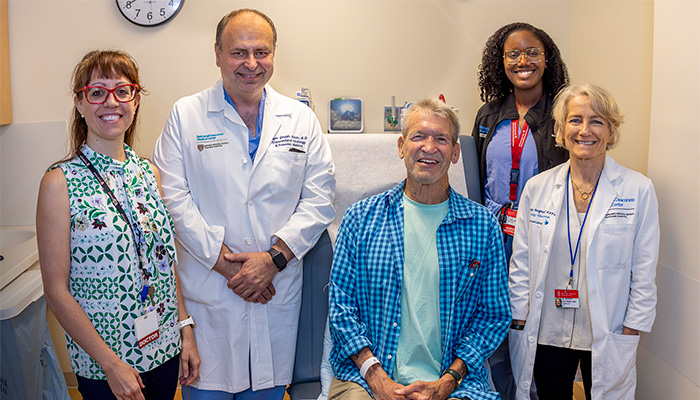Life-Changing Option for Heart Valve Repair
AUGUST 23, 2024

The first sign of trouble was his ankles. In the spring of 2023, Peter Elliston, an 82-year-old retired teacher and bookstore owner began to notice that his legs and ankles would significantly swell following his long daily walks with the dog. A lifelong athlete with four marathons to his credit, Elliston noticed he would often grow short of breath, including during his daily swims.
Concerned, he consulted his cardiologist, who ordered an echocardiogram to evaluate the functioning of Peter’s heart muscles and valves. The imaging scan revealed that Peter’s tricuspid valve was leaking, a condition known as valve regurgitation. Peter’s cardiologist recommended consultations at BIDMC with interventional cardiologist Roger Laham, MD, and advanced heart failure specialist E. Wilson Grandin, MD.
“The heart contains four valves that regulate blood flow, opening and closing with precise timing,” explains Dr. Laham, director of the BIDMC Structural Heart Program. “When a heart valve starts to leak, it forces the muscle to work harder to pump blood throughout the body. If left untreated, this can put patients at risk of developing heart failure and other serious complications.”
The heart’s tricuspid valve has sometimes been called “the forgotten valve” for the lack of effective treatments when it becomes damaged. Fortunately for Peter and other patients, BIDMC is among the first centers in New England to offer a new minimally invasive treatment option for tricuspid regurgitation. Known as transcatheter edge-to-edge repair, the treatment involves positioning a tiny medical device called a TriClip to hold together a portion of the valve’s leaflets (flaps of tissue), thereby stopping the leaking and helping blood flow in the right direction.
Peter underwent the procedure at BIDMC just weeks after the new device received approval from the U.S. Food and Drug Administration (FDA) in April 2024. Today, he says, the treatment has not only helped to reduce his shortness of breath and swollen feet and ankles, but has also been a tremendous source of relief. “The peace of mind is huge,” he says.
A Leader in Valve Repair and Research
The TriClip procedure was first performed at BIDMC as part of the nationwide Triluminate clinical research trial, one of numerous clinical studies currently underway in the Structural Heart Center.
“Clinical trials provide our patients access to many new minimally invasive therapies,” says Dr. Laham. “This is particularly important for patients who are older or are already living with existing heart disease, for whom open heart surgery would prove too high a risk.” Dr. Laham leads a multidisciplinary team of specialists in interventional cardiology, cardiac surgery, cardiac anesthesia, echocardiography, and heart failure in screening and enrolling patients for participation in clinical trials, which have also recently included trials testing MitraClip treatment for mitral valve regurgitation. “Our team is committed to restoring quality of life for patients with tricuspid regurgitation and other valve diseases, who are often dealing with a number of exhausting symptoms,” commented cardiac surgeon David Liu, MD.
In their initial BIDMC visit with Dr. Grandin, Peter and his wife, Stella, were eager to understand Peter’s symptoms. “As we reviewed my echocardiogram images on the computer screen, Dr. Grandin pointed out that my heart’s upper chamber was growing larger, which was causing the tricuspid valve to leak,” Peter remembers. Now, they had to decide the best course of action.
With the Triluminate clinical research trial actively enrolling patients at BIDMC to investigate the new TriClip therapy, Dr. Grandin, Dr. Laham and the Elliston family decided that Peter would be a good candidate to be screened for the study. “As soon as we realized that the TriClip treatment was minimally invasive and would be performed through the veins rather than through open heart surgery, I became much more relaxed,” says Peter’s wife, Stella. “Dr. Laham was so reassuring; he inspired our confidence almost immediately.”
Clinical Trials Offer New Therapies
Eligibility to participate in the Triluminate clinical trial was reserved for patients diagnosed with severe tricuspid regurgitation, based on a range of 1 to 6, with 6 being the most severe. Peter’s disease severity was rated a 5. Peter was one of several patients who underwent a comprehensive screening process as part of the clinical trial, according to Jenifer Kaufman, DNP, ANP-BC, BCPA, manager of the Cardiovascular Clinical Research Program at BIDMC.
“The CVI is often selected as a clinical trial site for structural heart and other therapies because of our significant experience and our highly successful track record,” says Kaufman. The busy program is currently screening and enrolling patients for 20 cardiovascular clinical trials, as well as actively following up with patients who were participants in 31 earlier trials.
Although Peter was not ultimately enrolled in the study, he was an ideal candidate for the TriClip procedure when BIDMC became the first hospital in New England to perform the minimally invasive therapy following FDA approval last spring. In April 2024, he underwent the procedure to repair his tricuspid valve.
“After the procedure was completed, Dr. Laham told me I had gone from a 5 to a 1 in terms of severity,” says Peter, who went home after two nights in the hospital. With only small minor incisions from the minimally invasive treatment, Peter was able to quickly get back to his routines. “Peter’s biggest challenge was avoiding swimming for two weeks,” laughs Stella. “That was probably the hardest part of the recovery for him.”
“The uncertainty of my health weighed on us for a long time,” adds Peter. “What’s most important for me and my family is that the waiting and worry are over.”
Learn more about the BIDMC Structural Heart Program.
